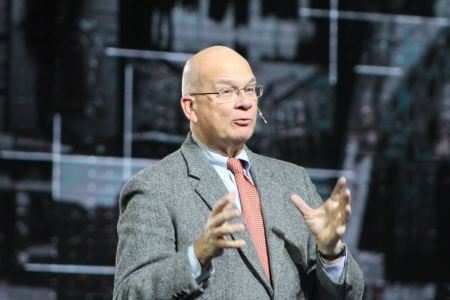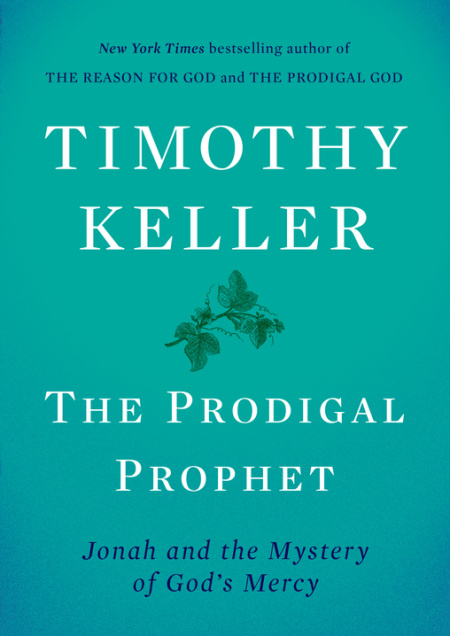Tim Keller on evangelicals and politics, social justice, how churches should treat non-Christians

Timothy Keller spoke with The Christian Post about media perceptions of evangelicals and politics, the debate over whether Christians should support social justice, and what the book of Jonah teaches the Church today about how to treat non-Christians.
In The Prodigal Prophet: Jonah and the Mystery of God's Mercy, which was released Oct. 2, Keller, author and founding pastor of Redeemer Presbyterian Church in New York City, examines Jonah's moral messages, especially in regards to how believers should treat those who are of a different race and religion.
"God wants us to treat people of different races and faiths in a way that is respectful, loving, generous, and just," wrote Keller in the newly released book.
In an Oct. 29 interview with The Christian Post, Keller explained that as a pastor, he has preached on Jonah multiple times over the years, with the application of the message changing from time to time.
For example, when he preached about it while serving a church in Virginia decades back, he applied the book to race relations; in 2001 at the Manhattan-based Redeemer Presbyterian, the application came to the issues surrounding 9/11.
"Basically, I would preach the book pretty much the same way, but the applications changed over the years because the situation changed," said Keller.
CP's interview with Keller focused on multiple topics, including how well American churches are treating those with different religious beliefs, whether "social justice" is compatible with Christian teaching, and his thoughts on the apparent trend of younger evangelicals opting to leave the Republican Party. Below are excerpts from that interview.
CP: On multiple occasions in your book, you point out that the pagans acted better than Jonah, showing us that "Christians should be humble and respectful toward those who do not share their faith." How well do you believe American churches do that?

Keller: It depends on the church and where they are, but in general not terribly well, I don't think. I think there certainly is in almost all American churches, certainly the evangelical churches, they always express concern for the lost. So they express concern for people of other faiths or no faith. But there are other ways in which the attitudes sometimes are paternalistic.
Many, many churches and Christians, when they do evangelize nonbelievers, are harsh and condescending. I have seen it. So I would say, even though Jonah did eventually go to Nineveh, he went to the city to preach there, but he didn't love the city. And he didn't love the people at all, didn't love them or respect them. And clearly, that's one of the messages of the book is that it's not enough just simply to preach at people, you also have to love and respect them, too. So you shouldn't just be preaching at nonbelievers, you should be caring, respecting, and listening to them as well. So yeah, I think that's one of the messages of the book.
CP: In your book, you wrote "We deserve the critique of the world if the church does not exhibit visible love in practical deeds." In your opinion, right now where does the current American church most deserve "the critique of the world"?
Keller: There's so much emphasis [in the news media] on "all evangelical Christians are backing Donald Trump and the Republicans." And of course the world church, which is largely non-Anglo, non-white, is more politically diverse. You cannot characterize worldwide evangelicalism as simply conservative or liberal.
In some ways they're more liberal because there's a lot more poor people, a lot more nonwhite people who care about justice, but at the same time they are very conservative when it comes to sex and gender and things like that. So they're looking at the American church and they are asking questions. They're saying "Why aren't you caring more for the immigrant?" "Why aren't you caring more for the poor?"
I think that the media tends to simplify everything, tends to generalize. And so, in some ways I don't think that's completely fair, but it's partly fair. So that the world and the world church are looking at the evangelical church and thinking right now, the American evangelical church has been caring more about its own political power than it does about the outsider, the marginalized. I don't think that's completely fair, because I think there are plenty of churches that are not like that. Plenty. Nevertheless, there's enough that I think there's criticism.
CP: In Chapter 7, you noted that Jonah's ministry in Nineveh involved both social reform and preaching about God's judgment. Recently, there has been a debate in evangelical circles over whether "social justice" is compatible with Christianity. What is your view?
Keller: Jesus asks "what does it mean to love my neighbor?" Jesus points us to a man in the Good Samaritan parable, he's pointing us to a man who gives social, practical, material, medical, economic help to a man of a different race and religion. Here's a man of a different race and religion, he's picking him up and he's risking his life, and he's spending money on him, and then Jesus says "go and do likewise."
The Bible says, Christians have got to not just evangelize people, they also got to be loving their neighbor. And they see their neighbor in trouble, they're supposed to go out there and they're supposed to help them, even materially, even economically. We have to do whether they believe like we do or not. In other words, we have to help our neighbor even if they are not Christians.
They say, "oh yeah, yeah, yeah, that's the Good Samaritan parable, but that's not social justice." And I'm thinking, well then I don't know what you mean. I just don't even know what you mean, because you can call it what you want, but that's what you have to do. You don't just evangelize, you also have to love your neighbor in the practical way.
And that includes people who are not Christians. So I could say, you call that what you want, but that's what the Bible says.
And I usually find with the people who say that Christianity is not compatible with social justice is usually they have in their mind a government imposed, centralized economy, high taxes, redistribution of wealth, that happens through a kind of a socialist government-run economy.
I always say, I don't think the Bible speaks directly to that. I can imagine somebody making a case for it, because we're supposed to care about the poor. But I can also see a good case from the Bible being made against it, because the Bible talks about private property. And the importance of private property. So I would say what the government should be doing today with regard to tax structure and how much it should be helping the poor, that is not something the Bible speaks directly to. It's not something I'm speaking directly to and I'm talking about Christians supposed to do. And Christians are supposed to pour themselves out for the needy, for the marginalized, we're supposed to be Good Samaritans.
I would consider that to mean justice, but other people think by the term justice, that they're talking about government intervention and the economy. And I am not going there.
We are supposed to be not only evangelizing our neighbors, but loving our neighbors like the Good Samaritan. I would call that "social justice."
If you don't want to call it that, fine. I think we should all agree that we have to do that.
CP: In Chapter 11, you argue against Christians should never allow the Church to align with any one political party. Some, The New York Times among them, have argued that young evangelicals are moving away from the Republican Party, and increasingly they consider themselves "politically independent" or "politically homeless." What is your opinion of this apparent development?
Keller: That there's a lot of evangelical young Christians who feel homeless politically, I do agree with that.
African-American evangelical Christians tend to be Democrat; white evangelical Christians tend to be Republican. The ones I know, on both sides, are really pretty significantly uncomfortable in their parties. So the black Christians I know say that though they like many things that the Democrats do, it's become so secular and so anti-religious in many ways that they often are feeling very, very out of place. And I know a lot of white evangelical Christians who also have felt that the Republican Party doesn't talk enough about the importance of racial justice, etc., so they are feeling a little alienated.
When you say "homeless," The ones I know about usually do still end up pretty much following one party or another, but they – I hate to say it this way – but they kind of hold their noses too.
Most of the ones that feel homeless are still trying to deal with one party or the other, which I think is good, frankly.





















